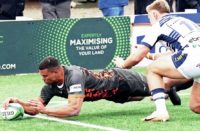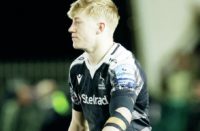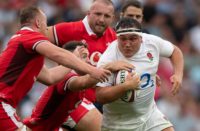 Balance is something that every successful team must have and from before my glory days to England's World Cup winning team it's the one thing that all successful sides have in common – and that's exactly what we have seen Stuart Lancaster striving to achieve during this Autumn International series.
Balance is something that every successful team must have and from before my glory days to England's World Cup winning team it's the one thing that all successful sides have in common – and that's exactly what we have seen Stuart Lancaster striving to achieve during this Autumn International series.
To balance a team that is not only learning the business of international rugby but is also expected to win against teams that have been together for a number of seasons, is something that is almost impossible.
What has to be remembered is that Lancaster took over in March and brought stability to an England team that had been in a stuttering downward fall in the IRB rankings since the World Cup win in 2003.
It remains a fact that England are the country with the worst record of results after a World Cup win, losing two games in the following Six Nations and then, after a disastrous summer tour in 2004, suffered a merry-go-round of new head coaches beginning with Andy Robinson and ending with Martin Johnson.
Lancaster has managed to halt that fall and restore confidence, not only to the players but also the fans and, despite the doom mongers constant call for a total restructure of the elite rugby at the RFU, he appears to be making progress.
The thing about balance is you can't always get it right first time and some readjustments may have to be made in order to regain the equilibrium – that's what the Autumn Internationals have shown.
The successes and failures of this campaign have left Lancaster with some tough and easy choices as they move towards the next Six Nations championship.
First the easy choices: Barring injury his first choice of props is simple with Dan Cole and Alex Corbisiero having shown their quality with some strong games while Joe Marler, Mako Vunipola and David Wilson are still battling for the bench.
At hooker, Tom Youngs proved that the loss of Dylan Hartley was not as big a catastrophe as some had thought and, because Youngs is less reckless that Hartley, he may prove the better option in the long run.
In the second row, the successful arrival of Joe Launchbury on the international scene and the recovery of Courtney Lawes from injury gives England a combination that could rival any in the world with the added bonus that both are so young they could play in both 2015 and 2019 World Cups.
Scrum-half is sorted with Danny Care and Ben Youngs recreating the Matt Dawson/ Kyran Bracken rivalry that served England so well in the build up to 2003.
Now we come to the hard part: Back row remains the first of the unbalanced areas of Lancaster's team as he struggles to find the right combination or even the right players with still no true specialised openside in the squad.
Fly-half and centre are areas of apparent strength, but in reality, totally out of balance. Toby Flood, Owen Farrell and Freddie Burns, with Danny Cipriani waiting in the wings, are the possible 10's come the World Cup, but so far none have dominated that role, although Farrell's fine show yesterday will have done his case no harm.
The centre combination of Brad Barritt and Manu Tuilagi is out of sync as both players are too similar in style and lack the necessary ball skills to be that crucial ‘second link' despite their better display yesterday.
Jonathon Joseph could fill that role but I feel that Farrell is the one best suited, particularly as many, including a few high profile coaches, have expressed doubt as to his ability as a true 10.
He is without doubt a major young talent but has not settled into any particular position, playing centre for his club and fly-half for England who seem to assume that the goal-kicker must play fly-half.
Tuilagi is a game breaker if put into a bit of space because of his ability to power through tackles and draw defenders, creating space for others. He lacks the ‘off load' ability of a Ma'a Nonu or a Will Greenwood although he seems to be learning.
Barritt is more organised than Tuilagi but is essentially also a power player rather than full of skills whereas all the most successful sides have a balance of a power player and skills player.
Will Carling (power) and Jerry Guscott (skills) England, Jason Little (skills) and Tim Horan (power) Australia, Mike Tindall (power) and Will Greenwood (skills) England, Gordon D'Arcy (skills) and Brian O'Driscoll (power) Ireland, Jamie Roberts (power) and Jonathan Davies (skill) Wales, Nonu (power) and Conrad Smith (skills) New Zealand. All these players were or are at the heart of their team's success and it is that balance that Lancaster has yet to find.
Wingers and full-back are interesting in that the England selection currently favours full-backs over wings with three 15s – Ben Foden, Mike Brown and Alex Goode – against three wings – Chris Ashton, Charlie Sharples and Ugo Monye – in the EPS, while the team usually consists of one wing and two full-backs.
Although players nowadays are expected to be multi-skilled they surely must first be expert in the position they play which inevitably means they will not be as ‘instinctive' when playing in another position.
Balance is picking the right players in their right positions which makes them feel comfortable and at home in the knowledge they can perform their role without thinking.
Only when England can play instinctively without the delay of having to think will Lancaster have achieved the balance needed to win a World Cup.


























